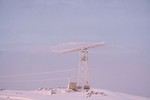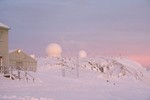Rime ice
June 24th, 2006It’s turned colder and calmer in the last few weeks, which has given us lower temperatures (routinely lower than -10, and down to -18 as the lowest so far) and some interesting weather effects. The prettiest of these is rime ice – ice crystals that form on exposed surfaces. With the right weather conditions these can get pretty big.
The most striking place that rime ice forms is on our masts and antennas. In extreme cases the weight of the ice can cause them to collapse, but it this stage it just shows them up clearly against the dark sky, allowing them to be easily photographed!

Rime ice on a guy wire
Lots of my radio-buff friends have asked to see pictures of the antennas, so here they are – and they’re unusually pretty!
This is a general view of the masts on the South end of Rothera Point. From left-to-right we have the large VSAT dome (which provides our satellite internet link) and behind the “East-West” wideband dipole array, which is used for aircraft and field party communications in the summer. The smaller dome is the ARIES system, which receives weather satellite pictures. At the far right of the picture is the non-direction beacon (NDB) which is an aeronavigation aid – it works on a low frequency (136kHz) and so the transmitter is a radiating tower with a large earth mat.
The low masts in the foreground carry feeder and power cables strung on catenary wires to the main antennas and to a couple of scientific instruments on the point. The dark mast to the left of the NDB is the base flagpole, showing that it’s completely calm day.

The East-West antenna from other side.

The RLPA antenna – Andy Barker and I assembled this last year

The North-South wideband dipole – also used for aircraft comms

